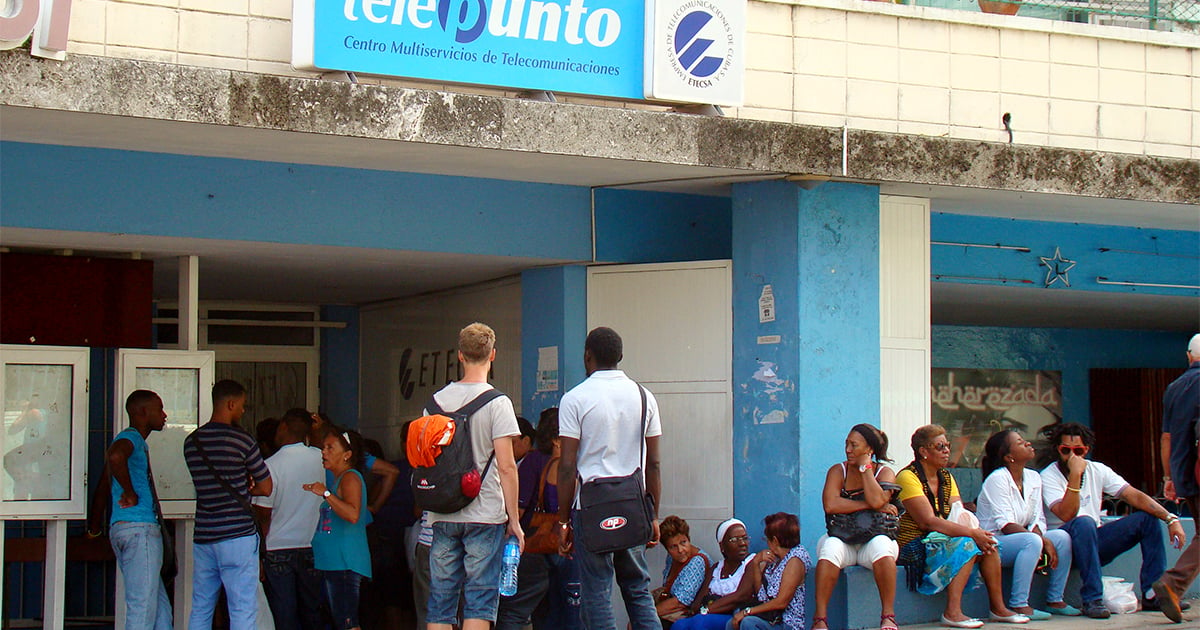Amid Cuba's severe monetary and connectivity crisis, exacerbated by the government's skyrocketing tariffs, ETECSA has unveiled new international top-up offers. However, these offers conceal a troubling reality: the state-owned telecom company is valuing the dollar at less than 25 Cuban pesos (CUP), even though the informal market rate exceeds 375 CUP. This scheme, available on platforms like Mobile Recharge, involves a fictitious currency exchange that significantly boosts the state's revenue at the expense of emigrants and domestic users.
Promoted as a "special offer" for Father's Day from June 9 to June 15, these packages provide data ranging from 25 to 125 GB, along with unlimited Internet access between midnight and 7:00 a.m. Yet, the disparity between the cost of these top-ups and the value received in Cuba highlights a stark economic imbalance. For instance:
- A €21.45 top-up delivers only 500 CUP, translating to an exchange rate of 23.3 CUP per euro.
- A €107.15 top-up also provides 2,500 CUP, equivalent to 23.3 CUP per euro.
- The "premium" Father's Day offer allows for a 1,500 CUP top-up for 65.99 USD, amounting to 22.7 CUP per dollar.
In stark contrast, as of Monday, June 9, the informal exchange rates in Cuba are:
- USD = 375 CUP
- EUR = 400 CUP
- MLC = 262.5 CUP
Thus, what ETECSA offers represents less than 7% of the true value of money sent from abroad.
A Widening Gap of Discontent
Social media has become a platform for widespread indignation. Users argue that these offers are not only economically exploitative but also serve as emotional blackmail, capitalizing on a sentimental occasion like Father's Day to persuade emigrants to pay inflated prices. Meanwhile, most island residents struggle to survive on salaries in Cuban pesos, making access to these services unattainable.
As highlighted in a recent CiberCuba report, many criticize the economic absurdity of these offers. One user remarked, "In Cuba, that offer would cost about 5,000 CUP, which at the informal rate would be around 12.5 USD. But ETECSA charges 22 USD abroad. Where's the business?"
The Cuban Peso's Illusory Value
The situation reveals that the Cuban peso no longer holds any real reference value within the state system. In mid-April, the regime itself acknowledged that the average salary in Cuba equates to only 16 dollars per month at the informal exchange rate. Despite this, the government refrains from selling dollars or euros to the public through CADECA, while ETECSA continues calculating international top-up values as if the official exchange rate still governed the economy.
This currency manipulation has two clear effects: it maximizes the Cuban state's foreign currency income and severely diminishes the value received by users on the island. Ultimately, it is a grotesque and abusive method of extracting foreign currency from the Cuban diaspora, no longer disguised by enticing promotions or connectivity promises.
An Unsustainable Model and Growing Rejection
ETECSA's executive president, Tania Velázquez Rodríguez, recently admitted that the average revenue per mobile line in Cuba plummeted from 133 dollars in 2018 to just 31 dollars in 2024. She blamed users for "frauds" and "top-up hijackings" but avoided acknowledging that the model's foundation is flawed due to an unrealistic exchange rate, a dual economy, opacity in the state company's accounts, and growing corruption allegations among its executives.
Her moment of greatest candor occurred during her first appearance on the Mesa Redonda program, where Velázquez Rodríguez justified the price hike by stating, "There is a market outside Cuba that wants to communicate with their families." Meanwhile, on the island, ETECSA's new national prices—implemented after the so-called "tariff increase" on May 30—have also sparked backlash, particularly among university students who have decried the resulting digital exclusion and forced disconnection due to these policies.
In this context, ETECSA's international top-ups are no longer viewed as a commercial strategy but as an institutional tool for extractive abuse. The company has turned a necessity—connectivity—into an opaque business, sustained by a fictitious exchange rate that disregards the country's reality and punishes those most in need of communication.
Understanding ETECSA's Currency Exchange Controversy
Why is ETECSA valuing the dollar at less than 25 CUP?
ETECSA is valuing the dollar at less than 25 CUP to maximize its revenue from foreign currency transactions, despite the informal market rate being significantly higher.
What impact does this have on Cuban users?
Cuban users receive a much lower value for their money compared to the actual worth on the informal market, which exacerbates their economic challenges.
How are international top-ups viewed in Cuba?
International top-ups are increasingly seen as a mechanism for institutional abuse, exploiting the need for connectivity while offering minimal value in return.
